|
|
|
Sort Order |
|
|
|
Items / Page
|
|
|
|
|
|
|
| Srl | Item |
| 1 |
ID:
159475


|
|
|
|
|
| Summary/Abstract |
The growth of Chinese military power poses significant challenges to Japan. China's military spending, which was half that of Japan's in 1996, is now three and a half times as large. Japan has taken a range of measures to buttress its military forces and loosen the restrictions on their operations, but much remains to be done. Most important, Tokyo needs to reexamine its strategy to maximize Japan's deterrent leverage. Of the three general approaches to conventional deterrence—punishment, forward defense, and denial—Japan's best option is to shift to a denial strategy. Such a strategy, built around a resilient force that can survive attack and attrite an encroaching adversary, can make the risks to a potential attacker unacceptably high. In Japan's case, such a strategy would leverage the inherent dangers that Beijing would face in contemplating a prolonged war against Japan and its U.S. ally. The strategy, updated to reflect the imperatives of air and maritime warfare in the precision strike era, would require a high level of dispersion and mobility and might therefore be labeled “active denial.” Adopting an active denial strategy would buttress Japan's defense and deterrent capability while reducing first-strike incentives and improving crisis stability.
|
|
|
|
|
|
|
|
|
|
|
|
|
|
|
|
| 2 |
ID:
170316


|
|
|
|
|
| Summary/Abstract |
This article contextualizes and clarifies the political and security components of China's contemporary strategic engagement with developing countries. Over the last decade, China has adopted a more self-confident and assertive foreign policy, under which political and military elements have become more prominent. This approach places renewed emphasis on China's position in and leadership of the developing world. China's leaders look to coordinate policy with "newly emerging powers" to support and foster what they identify as the trend towards a more "multipolar" world order, that is, soft balancing against American "hegemonism." Moreover, Beijing seeks to curry favor with and raise the voices of developing countries in international institutions to build a normative constituency against American unilateralism. As part of this effort to "democratize" international relations, Beijing has also underwritten a constellation of China-dominated regional institutions that harmonize its policies and provide venues to build strategic relationships with developing countries.
|
|
|
|
|
|
|
|
|
|
|
|
|
|
|
|
| 3 |
ID:
080073
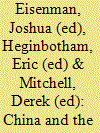

|
|
|
|
|
| Publication |
Armonk, M E Sharpe, 2007.
|
| Description |
xxiii, 232p.
|
| Standard Number |
9780765617132
|
|
|
|
|
|
|
|
|
|
|
|
Copies: C:1/I:0,R:0,Q:0
Circulation
| Accession# | Call# | Current Location | Status | Policy | Location |
| 052953 | 327.5101724/EIS 052953 | Main | On Shelf | General | |
|
|
|
|
| 4 |
ID:
114511
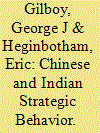

|
|
|
|
|
| Publication |
Cambridge, Cambridge University Press, 2012.
|
| Description |
xxx, 346p.Hbk
|
| Standard Number |
9781107031982
|
|
|
|
|
|
|
|
|
|
|
|
Copies: C:1/I:0,R:0,Q:0
Circulation
| Accession# | Call# | Current Location | Status | Policy | Location |
| 056748 | 355.033551/GIL 056748 | Main | On Shelf | General | |
|
|
|
|
| 5 |
ID:
143018
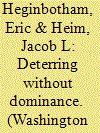

|
|
|
|
|
| Summary/Abstract |
Even as events in Iraq, Syria, and Ukraine have captured the attention of U.S. foreign policy elites, the United States faces key questions about its military position in Asia. In the face of growing Chinese power, can the United States continue to provide a credible deterrent in Asia without either bankrupting itself or pursuing risky strategies that raise new questions about crisis stability? While other security issues remain important, none will have a more fundamental effect on the U.S. military budget or the way the United States does business overseas.
|
|
|
|
|
|
|
|
|
|
|
|
|
|
|
|
| 6 |
ID:
124864
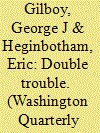

|
|
|
|
|
| Publication |
2013.
|
| Summary/Abstract |
An objective assessment reveals that India, simply because it is a democracy, will be no less likely than China as a rising power to pose significant challenges to U.S. interests. While Washington has basically gotten its China policy right, a new approach to India is needed.
|
|
|
|
|
|
|
|
|
|
|
|
|
|
|
|
| 7 |
ID:
053498


|
|
|
| 8 |
ID:
167326


|
|
|
|
|
| Summary/Abstract |
This article examines the domestic influences on US and Chinese nuclear forces. While strategic factors largely drive each side’s, underappreciated domestic and organizational factors also influence outcomes. Partisan politics shape US policies regarding arms control, missile defense, and the roles of nuclear forces. China has its own— more opaque—politics. Organizational factors have affected the status and role of the Chinese Rocket Forces. Constituencies for nuclear weapons have gained ground, and the military services appear to be competing for nuclear missions. The absence of organizational firewalls within the Rocket Forces suggests that assertive operational practices might bleed across different parts of the organization. These domestic influences on US and Chinese nuclear policymaking are likely to have interactive and accelerating effects. Both sides will assume measures taken by the other are driven by strategic intent, when the actual drivers may be mixed. To the extent that domestic factors are responsible, the resulting spirals of suspicion and conflict will be inadvertent—but may nevertheless take on a life of their own. While strategic nuclear interactions are not currently at the center of the bilateral relationship, they may come to be so in the future for all the wrong reasons.
|
|
|
|
|
|
|
|
|
|
|
|
|
|
|
|
| 9 |
ID:
192149


|
|
|
|
|
| Summary/Abstract |
At the 2022 Shangri-La Dialogue, Japan’s Prime Minister Fumio Kishida warned defense ministers from across the Indo-Pacific region that “Ukraine today may be East Asia tomorrow.” Russia’s war of aggression and China’s tacit support for the invasion have amplified the urgency of the threat posed by China’s economic and military rise and have informed material changes to Japanese defense policy.
|
|
|
|
|
|
|
|
|
|
|
|
|
|
|
|
| 10 |
ID:
163943
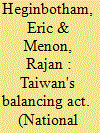

|
|
|
|
|
| Summary/Abstract |
Although Washington should not sacrifice Taiwan to placate Beijing, it must also refrain from using it as a stick for beating China.
|
|
|
|
|
|
|
|
|
|
|
|
|
|
|
|
| 11 |
ID:
106389
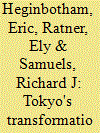

|
|
|
|
|
| Publication |
2011.
|
| Summary/Abstract |
Japan is undergoing profound changes that are empowering its political leadership at the expense of its bureaucracy. But rather than bringing about a clean transfer of institutional authority, the reforms have created gridlock. The U.S.-Japanese alliance isn't dead, but it is getting more complicated.
|
|
|
|
|
|
|
|
|
|
|
|
|
|
|
|
| 12 |
ID:
177885


|
|
|
|
|
| Summary/Abstract |
Despite rising threats and challenges in Northeast Asia, the US commitment to its allies there has become less certain. In part, this is by design. President Trump argued that less categorical signals would encourage US allies to do more, either in their own defense or to support (and finance) forward deployed US forces. Hearing this, Japanese and South Korean (ROK) leaders have been led to consider alternatives to the status quo. They increased defense budgets, a welcome development in Washington, but they also have taken measures that may complicate alliance dynamics, undermine crisis stability, and weaken the broader project of balancing Chinese power. Early in his term, President Biden pledged to improve alliance relations. But confronted with uncertainty, Japan and Korea continue to edge toward offensive systems, including missile forces, which may prove destabilizing in crises. They have also moved away from the roles- and missions-based specialization of military labor that has enhanced alliance efficiencies for decades.
|
|
|
|
|
|
|
|
|
|
|
|
|
|
|
|
|
|
|
|
|